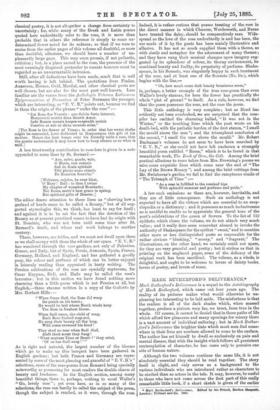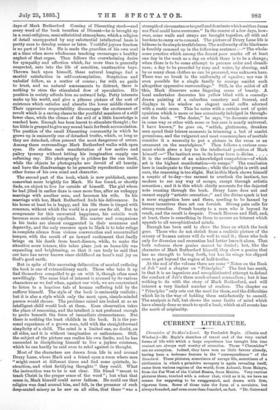MARK RUTHERFORD'S DELIVERANCE.* Mark Rutherford's Deliverance is a sequel to
the Autobiography of Mark Rutherford, which came out four years ago. The reality of its pictures makes what would otherwise be nn.- pleasing too interesting to be laid aside. The misfortune is that the realism is all of the dark shades which, when massed together, produce a picture. very far, we trust, from true in the whole. Of course, it cannot be denied that in those paths of life which afford few pleasures and many openings for misery there is a vast amount of individual suffering ; but in Mark Rut her- ford's Deliverance the brighter tints which most men find some- where in their lives are nowhere allowed to come to the surface. The author has set himself to dwell so exclusively on pain and mental disease, that with the insight which follows all persistent contemplation of character, he has come only to perceive one side of human nature.
Although the two volumes continue the same life, it is not absolutely essential they should be read together. The story itself is slight, and only serves as a background to the various individuals who are introduced rather as characters to be studied than as actors in the tale. It may, however, be useful to those who have not come across the first part of this really remarkable little book, if a short sketch is given of the earlier
• Mork Rutherford's Deliverance. Edited by his Friend, Reuben Shapoott. London: Triibner and Co. DM.
days of Mark Rutherford Coming of Dissenting stock—and every word of the book breathes of Dissent—he is brought up in a semi-religions, semi-atheistical atmosphere, which a religion of detail unsupported by any substantial intellectual basis is pretty mire to develop sooner or later. Youthful joyous freedom is no part of his lot. He is made the guardian of his own soul at a time when more wholesome teaching encourages a healthy neglect of that organ. Then follows the overwhelming desire for sympathy and affection which, far more than is generally suspected, eats into the life of sensitive, unattractive boys. Thrown back upon himself, these natural longings find a morbid satisfaction in self-contemplation. Scepticism and unbelief follow, as a matter of course ; for with no guide to trust, and no natural amusements to distract, there is nothing to stem the stimulated flow of speculation. His position in society affords him no outward help. Petty interests make up his world, and give a piteous picture of the sort of existence which satisfies and absorbs the lower middle classes. Their oppressive respectability discourages the excitement of revolt which is a saving clause to the youthful members of a still lower class, while the climax of the evil of a little knowledge is reached here. Enough has been learnt to stimulate thought ; far too little is grasped to give any sound basis for fresh accumulation. The position of the small Dissenting community in which he grows up is eminently one of detached truths, which, so long as they are detached, often present the most dangerous of errors. Among these surroundings Mark Rutherford walks with open eyes. He studies each manifestation of low motive and paltry tyranny without letting his imagination supply one softening ray. His photography is pitiless las the sun itself, while the objects he photographs are devoid of all beauty, and have the disadvantage to be generally reproductions under other forms of his own mind and. character.
The second part of the book, which is now published, opens somewhat more brightly for Mark. He has found, or shortly finds, an object to live for outside of himself. The girl whom he had jilted in earlier days is once more free, after an unhappy marriage with another man, and becomes his wife. In his marriage with her, Mark Rutherford finds his deliverance. In his home at least he is happy, and his life there is tinged with romance, without which the world is a poor one for all. But to compensate for this unwonted happiness, his outside work becomes more entirely repellant. His master and companions in his tasks are almost exaggerated in their meanness and depravity, and the only resource open to Mark is to take refuge in complete silence from vicious conversation and uncontrolled temper, with the result of an inward excitement that finally brings on his death from heart-disease, while, to make the situation more intense, this takes place just as home-life was expanding and brightening, so that it can truly be said that our hero has never known since childhood an hour's real joy on God's good earth.
But in spite of this unceasing delineation of morbid suffering the book is one of extraordinary mark. Those who take it up find themselves compelled to go on with it, though often most unwillingly. The same kind of interest is aroused by its various characters as we feel when, against our wish, we are constrained to listen to a hopeless tale of human suffering told by the sufferer himself. The style of the book is eminently realistic; but it is also a style which only the most open, simple-minded person would choose. The problems raised are looked at as an intelligent child would look at them. Keen observation takes the place of reasoning, and the intellect is not profound enough to probe beneath the force of immediate circumstances. But there is nothing the least childish in the book. It is the per- sonal experience of a grown man, told with the straightforward simplicity of a child. The mind is a limited one, no doubt, on all sides, and it is without imagination or enthusiasm. Still, the subject of the picture can realise his own limits, and he has succeeded in disciplining himself to live a joyless existence, which he can hardly be said even to rebel against in thought.
Most of the characters are drawn from life in and around Drury Lane, where Mark and a friend open a room where men "might resort at different times and find some quietude, in- struction, and what fortifying thoughts" they could. What the instruction was to be is not clear. His friend. "meant to teach Christ in the proper sense of the word "; but what that sense is, Mark himself could never fathom. He could see that religion was dead around him, and felt, in the presence of such deep-seated misery as he saw on all sides, that there "was a
strength of circumstance to quell and dominate which neither Jesus nor Paul could have overcome." In the course of a few days, how- ever, some waifs and strays are brought together, all with sad burdens to carry or to conceal. The picture of Drury Lane life is hideous in its simple truthfulness. The uniformity of its blackness is forcibly summed up in the following sentence :—" The whole- some practice which among the decent poor marks off at least one day in the week as a day on which there is to be a change ; when there is to be some attempt to procure order and cleanli- ness; a day to be preceded by soap and water, by shaving, and. by as many clean clothes as can be procured, was unknown here. There was no break in the uniformity of squalor; nor was it even possible for a single family to emerge amidst such altogether oppressive surroundings." Still, in the midst of all -this, Mark discovers some lingering sense of beauty. A local undertaker decorates his yellow blind with a coarsely. drawn painting of a suburban cemetery and funeral, and displays in his window an elegant model coffin adorned with a rustic cross. This he notes with a certain sort of quiet cynicism which is more or less consciously indulged in through- out the book. "The desire," he says, "to decorate existence in some way or other with more or less care is nearly universal. I have known," he goes on, "selfish, gluttonous, drunken men spend. their leisure moments in trimming a bed of scarlet geraniums, and the vnlgarest and most commonplace of mortals consider it a necessity to put a picture in the room or an ornament on the mantelpiece." Then follows a curious com- ment which gives a key to the intellectual position of Mark
himself :—" The instinct even in its lower form is divine It is the evidence of an acknowledged compulsion—of which art is the highest manifestation—to escape." The conclusion here is inadequate to the premiss ; while the insight is swift and sure, the reasoning is too slight. But in this Mark shows himself a sceptic of to-day—too earnest to overlook the instinct, too modern to see any way of escape, except through artistic sensation ; and it is this which chiefly accounts for the dejected note running through the book. Drury Lane does not and cannot supply "artistic sensation ;" and the divine spark is but a mere suggestion here and there, needing to be fanned. by keener incentives than art can furnish. Strong pain calls for strong remedies. Preach beauty to a man who is beyond. its reach, and the result is despair. Preach Heaven and Hell, and, at least, there is something in them to arouse an interest which appeals to all unsophisticated minds.
Enough has been said to show the lines on which the book goes. Those who do not shrink from a realistic picture of the misery of human nature will do well to read it ; those who look only for diversion and recreation had better leave it alone. That both volumes show genius cannot be denied ; but, like the character of Mark Rutherford himself, they show a genius that has no strength to bring forth, but has its wings too clipped even to get beyond the region of half-truths.
At the end of the volume there are some "Notes on the Book of Job" and a chapter on "Principles." The first has merit, in that it is an ingenious and. unsophisticated attempt to defend the conduct of Job's three much-abused counsellors ; but it has nothing to do with the story of Mark Rutherford, and will interest a very limited number of readers. The chapter on "Principles "only sets out the need for them, and the difficulties which lie in the way of holding them satisfactorily to oneself. The analysis is fall, but shows the same faults of mind which have already done so much to spoil a book, which at all events has the merit of originality.



































 Previous page
Previous page